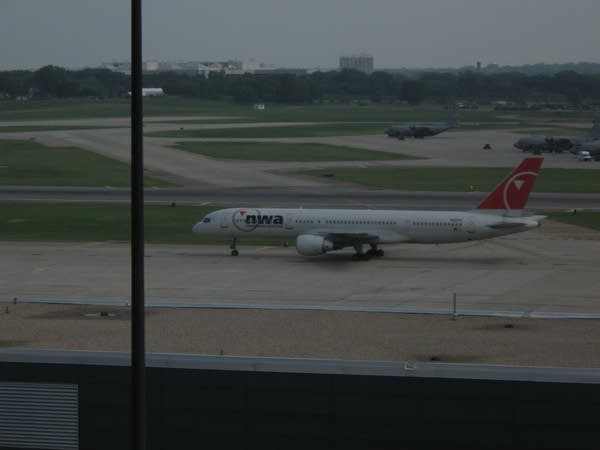Airlines could see a shortage of pilots
Go Deeper.
Create an account or log in to save stories.
Like this?
Thanks for liking this story! We have added it to a list of your favorite stories.

Northwest Airlines plans to hire up to 250 new pilots. Union officials say one of the key factors is that hundreds of pilots laid off in recent years don't want to come back to Northwest. They've either landed jobs with other airlines or changed careers.
Pilot David Shannon won't return to Northwest, even though he could soon be making more than $100,000 a year flying for the airline.

"I've taken quite a bit of a pay cut," Shannon says. "I'm away from home more often. It's putting more of a strain on my family. I just don't think I can go back to it."
At the age of 37, Shannon is poised to embark on a career as an orthopedic surgeon. He's nearing the end of his studies at Louisiana State University Medical School.
Turn Up Your Support
MPR News helps you turn down the noise and build shared understanding. Turn up your support for this public resource and keep trusted journalism accessible to all.
"The prospects are quite a bit better on the medical side," Shannon says. "I love to fly. I miss the job. But it wasn't the same job I hired on to."
Veteran Northwest pilots lament they have been hit with pay cuts of up to 40 percent, while their health, retirement and other benefits have been slashed. Other major airlines have cut pay and benefits as well.
Some analysts are forecasting a shortage of pilots for the airline industry, in part because many veteran pilots are so sour about the business.
Experts who predict a shortfall also note that foreign airlines are luring U.S. pilots overseas with enticing offers. And there are indications fewer people are studying to be commercial airline pilots.
"The public perception is that the airline has turned very ugly as a place to work. And people have just shied away from it."
The Federal Aviation Administration says it doesn't see a pilot shortage now. But the agency says there could be one down the road, given an expected surge in air travel in the future.
Kit Darby runs a firm that counsels pilots about their careers. He says across the industry as a whole, the demand for pilots far exceeds the supply.
"Even though there were as many as 10,000 furloughed at one point, during the period they were furloughed, the last six years or so, there have been over 40,000 openings," says Darby.
Hiring has been strong at regional and low-fare airlines, as well as cargo carriers.
Since 2000, for instance, JetBlue has added about 1,400 pilots. Pinnacle, one of Northwest's regional carriers, has brought about 850 pilots on board in the past six years. And now big airlines -- which shed thousands of pilots -- are starting to hire again.
Darby expects major airlines will eventually have to invest in training pilots to assure they have enough aviators.
"Big airlines have not felt this shortage yet," says Darby. "But the small airlines have pretty much cleaned out the flight schools. Airlines that are hiring aggressively have cleaned out the flight schools of instructors. And now we have a problem training the next generation of pilots because we lack the instructors to do so."
At Inver Hills Community College, the big problem isn't a lack of instructors for its pilot training program. The problem is a lack of students.
"Right now, there are about 30. There are usually 120," says Brian Addis, who manages the aviation programs at the college. Addis believes fewer people want to be airline pilots because they've heard nothing but gloom and doom about the industry for years.
"The public perception is that the airline has turned very ugly as a place to work," says Addis. "And people have just shied away from it."
Some industry observers expect the applicants will surely come back. Pilot jobs don't pay what they used to, but they still pay pretty well. For instance, at 16 of the largest airlines, a first officer with five years experience earns an average of $91,000 a year.
"Pilots who've been on furlough have enjoyed better times," says labor consultant Jerry Glass. "For pilots still coming up through the ranks, this is still a wonderful thing for them."
Glass predicts the veteran pilots accustomed to better times will be replaced.
"You're going to see new blood, new people coming into the legacy airlines," says Glass. "There is is just a tremendous amount of hiring taking place all over the industry now.
Northwest would only say there has been no shortage of interest among pilots wanting to fly for two of its regional airlines: Mesaba and Compass. Some 2,700 pilots are seeking jobs with those airlines.




